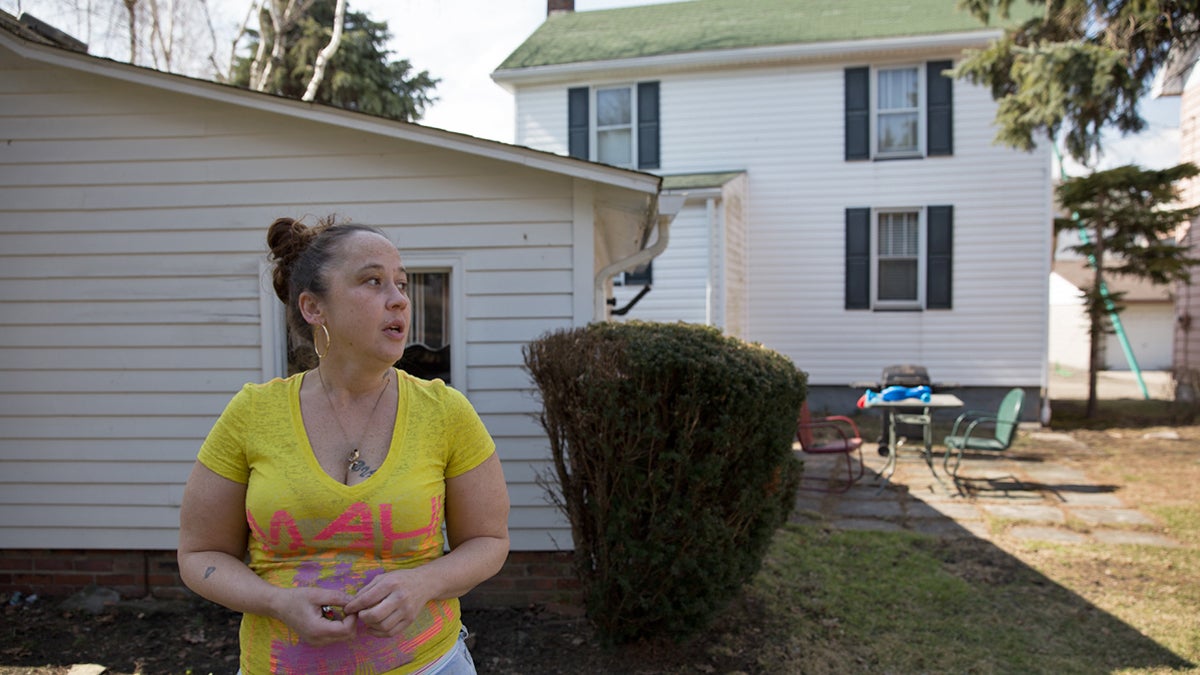Judge strikes down ban on renting to felons

Darcy Smith outside her home in Gallitzin
A Cambria County judge has overturned a borough’s prohibition against renting to drug felons.
A Cambria County judge has overturned a borough’s prohibition against renting to drug felons.
Judge Tamara Bernstein issued the ruling Thursday, more than four months after Darcy Smith sued the borough of Gallitzin.
Smith, 38, filed her lawsuit after getting an eviction notice upon moving into a new home with her three children. She’d been living elsewhere in the Gallitzin since her release from prison over a year prior.
Gallitzin is one of at least three communities in Pennsylvania where landlords cannot lease to people convicted of a drug felony within the past seven years . The other two are Sunbury, in Northumberland County, and Mifflinburg, in Union County.
Ruling details
Bernstein ruled the state’s Sentencing and Parole Codes and Landlord-Tenant Act both supersede Gallitzin’s ordinance.
She wrote that landlords can’t evict tenants simply to comply with the borough’s rules because a criminal record isn’t one of three justifiable reasons laid out in the Landlord-Tenant Act: the lease expiring, tenant violation of its terms or nonpayment by the tenant.
Aside from that, Bernstein sided with the defense’s contention that landlords who attempt to follow state law and Gallitzin’s ordinance would face an undue financial burden. State law gives tenants the right to a hearing (absent in the Gallitzin ordinance) and requires at least two weeks’ notice for evictions — during which time, the borough could fine $1,000 per day.
Bernstein also pointed to a 2011 court ruling that state Sentencing and Parole codes pre-empted Allegheny County’s restrictions on where sex offenders could live. Gallitzin’s lawyer Mike Crotty maintained that the Fross v. County of Allegheny dealt with Megan’s Law, so the decision shouldn’t apply because Gallitzin’s ordinance focuses on drug offenders. Bernstein rejected that argument.
“The state law that pre-empted the ordinance in Fross was not Megan’s Law alone, but the state Sentencing and Parole codes,” Bernstein wrote.
The decision didn’t address Smith’s claim that the ordinance is unconstitutional because it violates state and federal equal protection clauses.
What does this mean for the other two communities with similar laws?
Sunbury was the first to enact such an ordinance in 2012; Mifflinburg passed one in February 2015.
Unlike Gallitzin, Sunbury licenses its landlords and its rules against certain ex-offender tenants apply to that permitting process. That might mean the Gallitzin decision doesn’t apply, noted Sunbury Mayor David Persing.
Persing said the Northumberland County city would review the ruling anyway, just to be sure, and tweak its ordinance if necessary.
“In past, it’s often just a couple words that make a difference, and we just change the language,” said Persing, reached on his cell while tending to the city’s softball fields.
Officials probably won’t get to it for at least a month, though, he said.
Miffinburg’s mayor and solicitor didn’t immediately return calls Friday.
What’s next?
Gallitzin’s ordinance took effect at the beginning of this year, at the suggestion of Mayor Ray Osmolinski.
Reached at home Friday morning, Osmoliniski said he hadn’t seen or heard about the ruling. He declined comment until after reviewing it and consulting with Crotty, who was selected by the borough’s insurance carrier to handle the case.
Crotty also said he hadn’t seen the decision.
Borough Solicitor David Consiglio, who helped craft the ordinance, didn’t return calls seeking comment Friday. Smith, who didn’t return calls Friday, wasn’t seeking any damages in the lawsuit.
WHYY is your source for fact-based, in-depth journalism and information. As a nonprofit organization, we rely on financial support from readers like you. Please give today.




